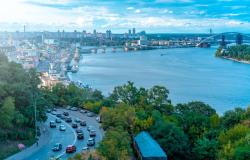Before Vienna: The Hans Kelsen of Brody

From Galicia to global legal thought. Robert Schuett places Kelsen at Europe’s centre and calls us to remember Ukraine’s place in its tradition of law and democracy.
Soon I will travel to Bogotá for the launch of the Spanish translation of my book, Hans Kelsen’s Political Realism. The trip is supported by the Austrian Ministry of European and International Affairs and the Future Fund of the Republic of Austria (grant P25-5890) – something I will say more about in due course.
Colombia is a fitting destination, because from first to last, Hans Kelsen’s legal and political philosophy has received worldwide attention. This includes Latin America, where his ideas on constitutionalism and the normative force of law have deeply influenced legal and political thought.
Hans Kelsen is widely regarded as one of the foremost jurists of the twentieth century. In a 1999 article for The New York Times, Bernhard Schlink, himself a former law professor and author of The Reader, captured this reputation by describing Kelsen as a “modest Old World gentleman” and suggesting that he may well have been the greatest of all jurists.
For me, at least, Kelsen stands among the greatest liberal minds of the twentieth century, and he remains my favourite political philosopher – and a political realist.
Yet if we are quick to map the global reach of Kelsen’s ideas, we should also pause to ask where he came from, not only in terms of his intellectual formation, but also his familial and cultural roots.
And as I prepare for my Latin America travels, I find myself reflecting not only on Kelsen’s intellectual contributions, but also on his lesser-known personal origins. While Kelsen is rightly celebrated for his contributions to legal theory, constitutional design, and international law, few know that his family roots lie in what is today western Ukraine.
Kelsen’s father, Adolf Kelsen (born Abraham Littmann Kelsen) and his grandfather, Osias Kelsen, came from Brody, in the Habsburg province of Galicia. The town was known in the 19th century for its vibrant Jewish life, multilingualism, and its role as a commercial and cultural gateway between East and West. Like many Galician Jews seeking opportunity in the imperial capital, the Kelsen family eventually moved to Vienna.
This forgotten biographical detail is more than a footnote.
It is a lineage worth recovering, especially at a time when Ukraine finds itself defending the very principles that animated Kelsen’s life work: legal order, sovereignty, and the primacy of law over violence.
In Vienna, the Kelsen family lived at Belvederegasse 3, in the city’s fourth district, just one block from where I live today. Adolf Kelsen ran a lamp workshop on nearby Goldeggasse 20, also within a block’s reach. These quiet streets near the Belvedere Palace once framed the everyday life of the young Hans Kelsen.
He attended elementary school in the fourth district and later studied at the prestigious Viennese secondary school, Akademisches Gymnasium, founded in 1553. It was there that he met Ludwig von Mises, who, like Kelsen, was born in 1881 and was also a Galician – Mises, one of the most notable economists and social philosophers of the twentieth century, came from Lemberg (now Lviv). The two became lifelong friends, part of a generation shaped by the intellectual crosscurrents of empire, migration, and modernity.
It is difficult to read Kelsen today without seeing echoes of Ukraine’s current struggle.
Since 2014, and especially since 2022, Ukraine has been defending not just its borders but its legal and constitutional identity. Its institutions have shown remarkable resilience in the face of aggression, including Russia’s attempts at Zersetzung writ large through hybrid warfare.
Kyiv’s insistence – the country’s insistence – on international law, its appeals to global legal bodies, and its defense of democratic norms are all profoundly Kelsenian in spirit even if they are rarely described that way.
It is striking how little known Kelsen’s Ukrainian roots are, even within Ukraine itself. This is perhaps understandable. For decades, Ukraine’s history was written largely in exile or under the constraints of imperial and Soviet narratives. Much was lost, obscured, or silenced. The intellectual history of figures like Kelsen – rooted in a multicultural, pre-national Galicia – did not fit neatly into any single national story.
The Galician legacy of international law is deeper than Kelsen alone. In recent years, Philippe Sands’s East West Street: On the Origins of “Genocide” and “Crimes Against Humanity” (2016) brought renewed attention to the Galician origins of two other monumental legal thinkers: Hersch Lauterpacht, who helped define the concept of crimes against humanity, and Rafael Lemkin, who coined and developed the legal concept of genocide. Both were born in what is now western Ukraine.
To place Kelsen alongside them is not to collapse their distinct contributions, but to underline a profound historical irony: that this once-overlooked corner of Europe helped produce the very legal architecture meant to constrain the violence that has so often swept across it.
But today, Ukraine is in the process of rewriting its own story, recovering voices, lineages, and traditions that can help define its modern identity. In this context, reclaiming Kelsen as part of Ukraine’s broader intellectual inheritance is not only justifiable; it is necessary. It reminds Ukrainians, and the world, that this country has long been part of the cultural and philosophical heart of Europe, not its periphery.
Kelsen does not belong exclusively to any one nation. Like many thinkers of his era, his life and work were shaped by exile, displacement, and transnational experience. But if Austria can celebrate Kelsen as a constitutional architect, and if international law can claim him as a founding theorist, then surely Ukraine can take some pride in being part of his familial lineage.
There is something profoundly moving in the idea that, amidst the trauma of war, Ukraine can look to its past and find, among the rubble of forgotten histories, a connection to one of the world’s greatest legal theorists. Kelsen’s insistence on law over violence, on the integrity of constitutional systems, and on the power of legal order to resist authoritarianism speaks directly to Ukraine’s present.
This is not a story of ownership, but of recognition. It is a call to remember that Ukraine’s intellectual contributions to Europe and the world run deeper than many assume. In an age of invasion, disinformation, and legal nihilism, Kelsen’s legacy offers not only theoretical insight but also moral clarity.
Ukraine’s future will be shaped not only by its courage in battle, but by its ability to preserve and strengthen its democratic institutions, and to build a prosperous state, ideally in a peaceful environment or, at the very least, firmly and fully integrated into the European Union.
In that project, Hans Kelsen, the great-grandson of Brody, stands as a fitting guide.
Robert Schuett is co-founder and managing partner at STK Powerhouse, a global risk advisory firm. A former Defence civil servant, he also serves as Chairman of the Austrian Political Science Association and is a long-standing Honorary Fellow at Durham University.
Photo by Alex P


